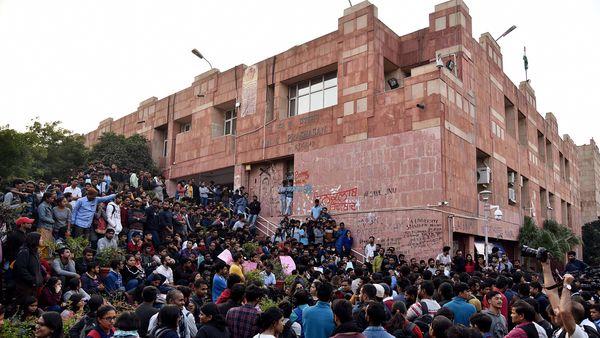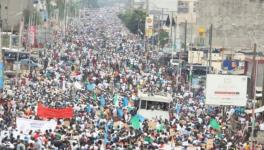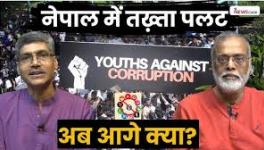Why JNU Is Being Disciplined and Punished

Representational Image. Image Courtesy: ANI
“A body is docile that may be subjected, used, and transformed… it implies an uninterrupted, constant coercion, supervising the processes of the activity... Politics, as a technique of internal peace and order, sought to implement the mechanism of the disciplined mass.”
These words from the famous book by French historian Michel Foucault’s seminal work, Discipline and Punish: The Birth of the Prison, were written in 1975 and ring true in 21st-century India. Specifically, they relate to what took place just about a week ago in the Capital-based premier university, Jawaharlal Nehru University.
A few days ago, a sting operation by a media house revealed two faces filled with pride and glory, of two young men, looking joyous as they admitted to having attacked, on the evening of 5 January, students at JNU. One of them, it turns out, is a first-year student. Having crushed a so-called enemy with brute force this 19-year-old betrayed a sense of achievement before the sting operation’s cameras. The emotions they betrayed on their faces have to be seen as the extension of a thought process that thrives on constantly demonising the ‘Other’. When animosity is internalised to the extent that it blends with and encompasses an individual, then he or she no longer searches for reasons to justify the violence they unleash.
The liberal is the Other, the secular is the Other, the intellectual is also an Other, those who raise questions are Othered, too, as are dissenters, critical thinkers, those who represent heterogeneity and migrants. All of them have been labelled and identified as antagonists, who are thought of as people who must be silenced, disciplined and punished. To such people, non-state actors can teach a lesson or two, knowing they will easily get away. Even street lamps will be switched off by (un)known hands to create the darkness that these lessons necessarily require.
In this context, those who expect an unbiased investigation of the violence in JNU are living in a fool’s paradise. “Understand”, as someone recently said, “the chronology”. The sequence of events is a glimpse into how, at every stage, the reality has been subverted by a combination of constructed hatred, populist imagination and media plots.
First, on the evening of 5 January, masked persons entered a central university campus in Delhi. (This, as the nation is repeatedly made to believe, is what masked figures must and should do to those who do not fall in line.) Their arrogant rods and hammers injured dozens of students and teachers. Make no mistake: they attacked as if they were taking part in a battle of honour against the so-called anti-nationals. The attackers drew impunity and strength from a belief that the nation should agree with them.
The barbaric violence was caught on camera. But the footage was not considered evidence enough in the post-truth era governed by majoritarian faith and feelings which do not care for rationality. The lesson from the JNU attack is that the nation should learn to selectively (un)see certain events. Several hours of the brutal rampage of these masked figures was wiped out of the media(ed) imagination. The footage of that evening was replaced by some irrelevant older footage.
Police were in a state of complete inaction during the violence. So what if that contradicts the uncalled-for police misconduct that unfolded in another university, in the same city, just a few days earlier. Students and teachers of JNU screamed for help but their SOS was never attended. The signal the inaction of police sends is that the normalisation of violence is something the nation should already have learnt to live with.
Criminals got away with a hideous organised crime. Yet, it is as if we are being told that the violence was no crime compared with the refusal of JNU’s students to adhere to majoritarian sentiments. The “nation” does not even want to know which of these is the actual crime.
After it took place, the university administration overlooked the rampage, as if it had not even occurred. But was any empathy expected from the network of actors who facilitated the entry and exit of masked goons who have stealthily let violence percolate, penetrate and peak in our psyches?
An A-list celebrity stood beside the victims, not uttering a word, but she was also blamed for sympathising with the so-called ‘tukdey-tukdey’ gang. Who is against the nation—the victims of violence, or those who inflicted the violence? What if the roles were reversed? What if there is a successful media trial against the victims, in which they are characterised as potential violators? This is exactly how students, ordinary citizens, even celebrities are often made into “anti-nationals” overnight in the popular imagination. This demonisation has become unusually normal in today’s India.
A section of the media is obsessed with the JNU students’ union not allowing registration of students for a fresh semester, and their alleged attack on the server room. Do we even remember that registration has been boycotted willingly by a majority of JNU students on the issue of a massive, fees hike that makes higher-education unaffordable? The students are participating in legitimate dissent to keep higher education accessible. Besides, without classes being held and exams being conducted in the previous semester, the question of fresh registration does not logically arise.
Perhaps we have also forgotten that the computer server is a thing. Even if it had been damaged, that can never be equated with threatening the lives of hundreds of students and teachers. And, how is it possible that students were still registering online on the same day, if the server had been broken? Why is the surveillance data of a premier institute not back-up on the cloud? Why are there not multiple backups of the surveillance footage? And if there are backups, then why was the attack on the server room used as an excuse for footage of the actual violence not being available?
It is evident that in the JNU episode victims are being framed as if they were the violators. After a few days, after some initial investigations, a different case altogether will unfold. Already, the prime suspect in this case was not even spotted with a weapon, nor found attempting assault in any of the images released by the authorities. Rather, our ability to rationally read images and, more importantly, question them if need be, has been successfully assaulted.
What happened in JNU was not a literal attack that can be summed up in the number of cases registered of attempt to murder, assault, causing damage, and so on. Rather, what happened in the university is part of an attack on the very idea of a university. The university as a free space for ideas and debates on them is repeatedly being targeted. The plan is to homogenise society, and the university is a site where plurality is readily available to be squashed. It is in the university that subjective interpretations can be flattened—in favour of Multiple Choice Questions.
The attack on JNU is not just an assault on the possibility of ever protesting against unjust fee hikes. It does not only undermine the democratically-elected students’ union and teachers’ bodies who supported the protest. It is an internal surgical strike on the ideological Other. And, literally, the attack is led by the iron rod of hate-filled authoritarianism.
Citizens have indeed become “an object and target of power”, as Foucault said in Discipline and Punish. Citizen’s bodies are objects of control that can easily be dominated through strict disciplining, regularising, controlling, correcting, coercing, constraining, prescribing and prohibiting, until complete submission is squeezed out of them, willingly or forcefully.
In a future university, adherence may not always be rewarded, but aberration will always be ferociously punished. Fear will be firmly established in the psyche. One section of society will be deployed to discipline, punish and scare another section of the masses. People will be used, mobilised and unleashed upon other to curate violent disorder in a new kind of univocal order.
The power of any totalitarian regime needs to repeatedly rehearsed. People need to be reminded of its dominance, and the way to achieve this is through building acceptance for everyday violence. If all this is being done—and hailed—in the name of nationalism, then we need to introspect on what sort of nation we inhabit.
Sreedeep is a former student of sociology at JNU. The views are personal.
Get the latest reports & analysis with people's perspective on Protests, movements & deep analytical videos, discussions of the current affairs in your Telegram app. Subscribe to NewsClick's Telegram channel & get Real-Time updates on stories, as they get published on our website.
























